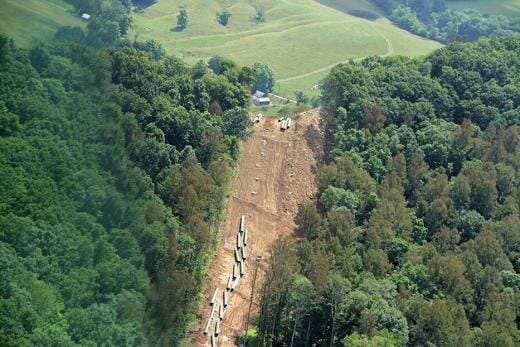
Over the past decade, energy companies have descended on the Mid-Atlantic to drill for gas in the Marcellus and Utica shales, which underlie parts of New York, Pennsylvania, West Virginia, Ohio, Virginia, and Maryland. These shale deposits have made the region a hotbed for hydraulic fracturing, or “fracking,” which involves injecting water, sand and chemicals at high pressure to shatter deeply buried shales and extract the gas. More than 10,000 wells have been “fracked” over the past decade. Now, energy companies are building thousands of miles of pipelines to move the product from the drilling fields to eastern energy markets. The shale gas industry is clearing forested areas for wells, building new access roads, withdrawing water from rivers and streams, and carving wide corridors through areas that have yet to see impacts from shale gas drilling—areas with high-value trout habitat. This industrialization of remote areas could have profound effects on fishing and hunting in the region.
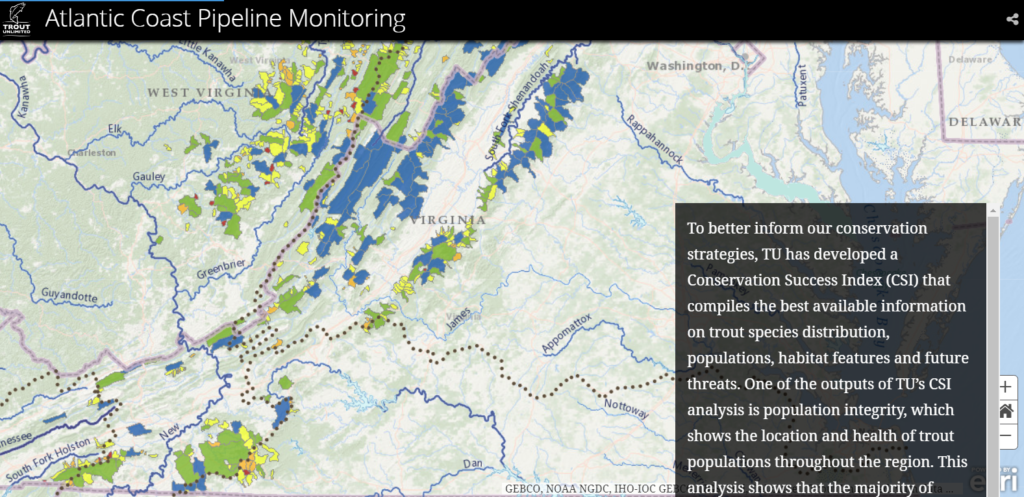
TU advocates for responsible energy development across the country. Here, in a region with some of the best trout water in the country and many of the East’s best remaining forested habitats, it is critical that shale gas and pipeline development be done in a way that protects these places special to sportsmen and women for future generations. Among the ways TU is working to protect our fish and wildlife resources:
- advocating for stronger policies and practices regarding shale gas and pipeline development at the state, local and federal levels;
- educating TU’s grassroots members about the threats to trout habitat from major pipeline development, and about how they can intervene in regulatory proceedings;
- monitoring gas drilling and pipeline impacts across critical watersheds via several hundred trained angler scientists in TU’s Coldwater Conservation Corps;
- promoting sound construction practices with willing industry partners;
- partnering with the Pennsylvania Fish and Boat Commission’s Unassessed Waters Initiative, surveying streams with the goal of discovering and protecting wild trout populations;
- facilitating the Sportsmen’s Alliance for Marcellus Conservation, a coalition of more than 280,000 sportsmen and women who are working together to identify and mitigate the impacts of shale gas drilling on hunting, fishing, trapping and other outdoor sporting activities.
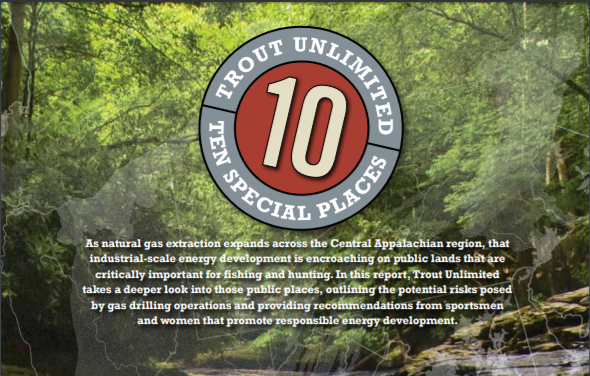
Click HERE to visit Trout Unlimited’s 10 Special Places report that looks at potential risks to public hunting and fishing grounds from shale gas development.
Victories
TU has been a staunch advocate for the protection of fish and wildlife habitat when it comes to shale gas exploration. From testifying at U.S. Senate hearings on energy and natural resources and participating in setting standards for best practices of energy development, to bringing the voice of sportsmen and women to state capitals in the region, TU is a valued voice when it comes to protecting coldwater habitat from shale gas drilling impacts. Over the past year, TU has:
- advocated for and attained wild trout stream designations for more than 500 streams in Pennsylvania (see “86,000 Miles of Streams” video, below), ensuring that more than 1,000 miles of streams received stronger protections under state water quality regulations when shale gas and pipeline infrastructure is proposed for these watersheds.
- Educated nearly 1,000 hunters and anglers across the region about the potential impacts from shale gas and pipeline development and opportunities to help protect sensitive fish and wildlife habitat.
- Developed a web map and planning analysis identifying areas of ecological significance that should be avoided by major pipeline infrastructure in the Delaware River Basin.
- intervened in major interstate pipeline development reviews, giving TU a seat at the table when decisions are made about development in trout watersheds.
- organized shale gas and pipeline monitoring training sessions for TU members and other volunteers across Pennsylvania, West Virginia and Virginia (see “Guarding our Waters” video, above), and hosted Snapshot Days to collect water quality data in National Forests.
- created a West Virginia trout atlas using Environmental DNA (eDNA) sampling to help identify trout streams in need of protection in the face of shale gas development.
Monitoring program
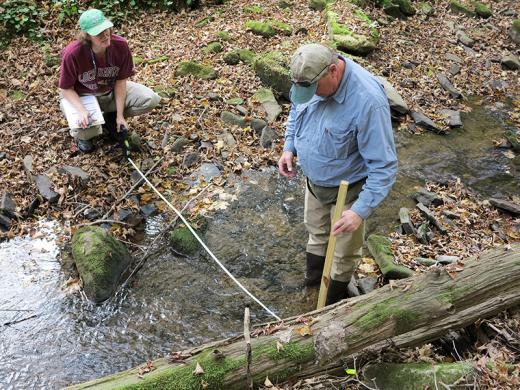
As part of its program overseeing shale gas development, Trout Unlimited has established a vibrant monitoring program that relies on citizen scientists. Central Appalachia’s coldwater streams are still struggling from century-old impacts from past energy development. This, coupled with urbanization and other land management issues, has left us with few intact and healthy wild and native trout watersheds. What is left of healthy trout habitat lies largely in areas with underlying shale gas deposits or areas being targeted for pipeline development.
With increased shale gas and pipeline development, trout watersheds in Pennsylvania, West Virginia and Virginia must be protected from ecological and environmental harm. Potential impacts to coldwater resources include sedimentation, habitat alteration, chemical spillage and major water withdrawals.
Developing and transporting shale gas requires the clearing of an extensive amount of land for well pads, access roads and pipelines. In Appalachia’s notoriously rugged and wet terrain, the clearing of this land can lead to erosion and sedimentation issues if proper best management practices are not required and followed.
Shale gas wastewater must be properly handled, transported and disposed of in order to protect nearby streams from pollution.
The Eastern Shale Gas Monitoring Program engages citizen scientists as the eyes and ears on the ground to identify and limit the potential impacts of shale gas development on coldwater streams. Through our Pennsylvania Coldwater Conservation Corps and W. Va/Va. Water Quality Monitoring Project, TU and our partners are engaging, training, equipping and supporting volunteers to monitor their local coldwater streams for impacts from shale gas and pipeline development.
Program tactics:
• Engage, train and support volunteers to collect water quality data and conduct visual reconnaissance to identify pollution events in watersheds experiencing shale gas development.
• Train and assist volunteers in reporting pollution events and making sure they are addressed to minimize impacts on coldwater streams.
• Engage, train and support volunteers to collect baseline data in coldwater streams in areas with a high likelihood of future shale gas and pipeline development.
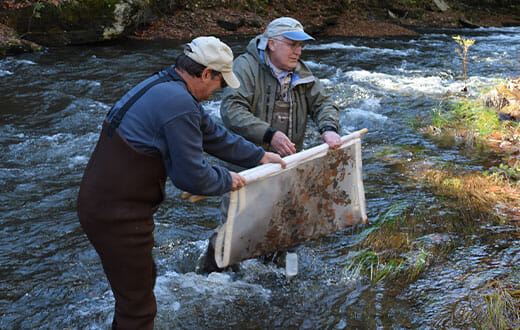
Since 2010 TU has trained more than 1,600 volunteers. Volunteer citizen scientists have completed more than 12,000 sampling trips to more than 1,000 sites throughout Pennsylvania, West Virginia and Virginia.
Citizen scientists are actively establishing baseline watershed conditions in coldwater streams with a high likelihood of future shale gas and/or pipeline development.
Volunteers have identified pollutions events as a result of shale gas development and notified the appropriate authorities. This has resulted in pollution issues being swiftly addressed, limiting damage to the aquatic ecosystem.
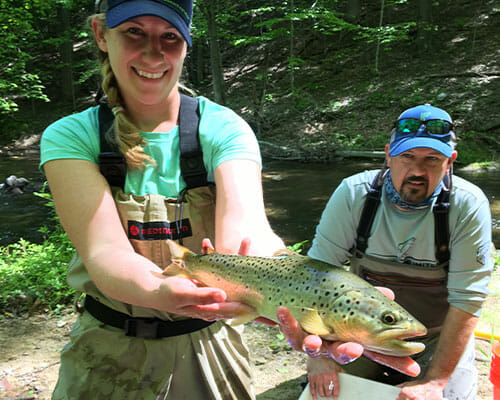
Staff Contact: Jen Orr-Greene, jen.orrgreene@tu.org, (717) 364-4368

